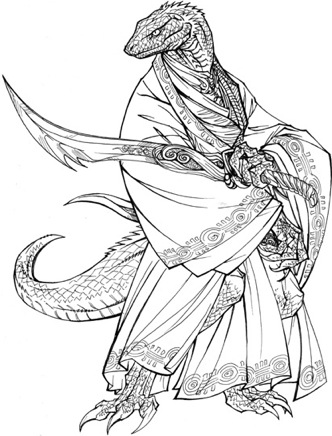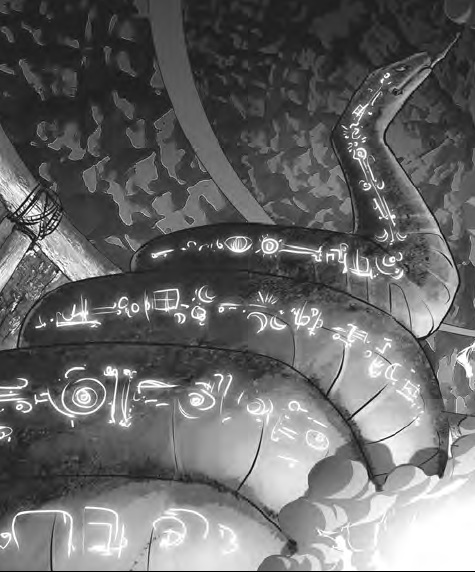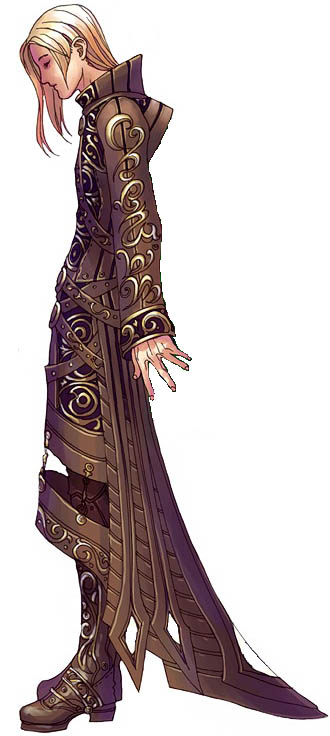Mahanaga

|
The once-prosperous town of Mahanaga was mysteriously destroyed by strange men clad in black who came out of a storm, looking for the Anathema. Its fields were razed and salted, its people put to the sword and its gods captured or simply destroyed. The Abbot and his monks all died defending the settlement, to no avail.
It has become a shadowlands, its trade route between Delbreth and the Keldin City-States abandoned for fear of the dark things it has attracted.
Contents
Mahanaga: Before the Destroying Storm
The town of Mahanaga is built at the foot of the great Monastery of the Serpent King. Several hundred years in age, the town manages a thriving and healthy economy based around farming (especially of rice) and the breeding of rare serpents as pets and sources of antivenin.
Serpents are naturally drawn to the Monastery, and the monks must routinely carry the serpents away from it, lest its corridors become too filled with them. They usually take these serpents down to the Fang Market in Mahanaga, where residents of the town are permitted to bid on ownership of those serpents. All such proceeds go towards supporting the monastery and its monks, while the residents of the town make more than their return in money. The monks who run the Fang Market have laws against non-residents from bidding in the Fang Market, which helps maintain the town's economy.
The town itself knows that there is a great serpent god associated with their town somewhere, though it is very reclusive. THe monks who serve him do not worship him, and forbid others from doing so, saying that it angers the Serpent King. In truth, the interactions between the Serpent King and the townsfolk of Mahanaga is somewhat more...intimate. Occasionally, a woman in the town will give birth to a child with beautiful golden eyes. Such children are destined to serve in the Monastery of the Serpent King as monks, and are brought to the monastery upon leaving childhood (around the age of twelve or so).
Noteworthy Locations in Mahanaga
The Monastery of the Serpent King
The Monastery of the Serpent King is, in actuality, an ancient Solar manse, built as a temple to the Unconquered Sun. The strange crenellations and designs along the sides of the staircase that lead to the top of the monastery serve a purpose: during Calibration, the sun’s position in the sky shifts subtly with each day, just enough to make it appear that the shadow of a serpent starts at the top of the staircase, and slithers further down the staircase each day of Calibration, ending its last day at the very foot of the stair.
Aspect: Solar; Rating: 3
Drawbacks: The Monastery of the Serpent King has the following Drawbacks:
- Maintenance •: Once a year at Calibration, as the shadow serpent slithers down the stairs, the priests within must perform a set of very simple rites to keep the flows of Essence within it carefully measured and precise. This takes one hour per day of Calibration, and there is one ritual for each of the symbolic stations of the sun.
- Habitability •: The Monastery is a massive, empty open space crafted of white marble and cunningly placed golden mirrors. It has no bedrooms or other facilities for habitation, though it can provide shelter in a pinch. The monks that serve here dwell in the town that sits at the foot of the mountain in a communal cloister there.
The Cloister
The Cloister is a small collection of buildings at the foot of the mountain on which sits the Monastery. Because of the austerity of the Monastery proper, it makes for poor living space, though the Serpent Monks take their lessons and use the holy place for meditation.
The Cloister itself has a variety of small cells for the Serpent Monks proper and a Postulant's Hall for those who are seeking admission into the monastic order while they are tested and learning the basics of the order's lessons. There is also a mess hall for the meals of spicy serpent meat (which some claim are prepared with small quantities of the venom of holy cobras) and rice that form the diet of the monks.
The Cloister also maintains a guest house, capable of hosting up to ten guests in satisfactory style, generally used for guests of the Monastery and Abbot.
The Platform
In the center of the village, in large square that overlooks the path up to the Monastery and the Cloister, stands the Platform, a circular, elevated stage of some antiquity. It is made of stone, though the surface of the Platform is a lacquered hardwood.
This Platform sees a variety of uses, from acting as a stage from whence the Abbot of the Monastery may address the people of the village to a performance place for traveling musicians. It is the center around which most festivals happen, as well. Generally speaking, the Platform is a sort of axis mundi for Mahanaga.
The Platform's most frequent use, however, is as a dueling stage. On an almost daily basis, young monks challenge one another to martial arts contests atop it, as do those folk of Mahanaga who can't seem to resolve their differences peacefully. Dueling isn't common among the citizenry, but it happens frequently enough that the young novice monks charged with keeping the Platform well cleaned rarely are without work to do.
Occasionally, traveling martial artists who have heard of the Serpent Monks and their talents come through here to challenge one or more of them. Even more rarely are those who come to challenge the Abbot of Mahanaga, a man renowned for his mastery of the supernatural martial arts, and a terrifyingly fast and skilled fighter.
The Fang Market
The Fang Market is where the Serpent Monks congregate once a week to sell the various serpents that have been drawn to the Monastery. All such sales are made to residents of the town, who then turn right back around and either sell the snakes to others directly, or take them home to use in the making of any number of local products: large serpents are butchered for meat and snakeskin, while venomous ones are milked for poison (either to be sold directly or turned into antivenin).
The Fang Market's center is called the King's Throne, and is simply a dias carved with serpent motifs where the monks do the selling. The rest of the Market is made up of the various booths, blankets and wagons where residents of the city sell their wares. By local custom, no one sells serpents or ophidian-derived products anywhere but the Fang Market.
A small pavilion built alongside the Serpent's Kiss caravanserai, facing the Market, is reserved for visitors and travelers who wish to watch the goings on while sipping tea. Important local merchants are often invited to meals beneath the canopy here to discuss large purchases of native goods.
The Serpent's Kiss
The only caravanserai in Mahanaga, the Serpent's Kiss caters primarily to merchants and other travelers who come through the area. The locals never congregate in its tearoom, by local custom.
The Fox Shrine
A white stone statue of a majestic-looking fox stands in a clearing between rice paddies. This shrine, reached by a small path of stepping stones that leads under a white-painted torii-style wooden arch is the shrine to White Field Steward.
Important Characters of Mahanaga
Abbot Uncompromising Viper

|
Uncompromising Adder has always known that he was destined for something greater. Growing up a native of Harborhead, Uncompromising Adder always sought the pure starkness of the wastelands. It was his only escape from poverty and the humiliation of a subjugated peoples.
When Luna chose him, she bade him first find those that might bind his form, and then to seek the Vermilion Serpent. His initiation rite into the Silver Pact came with intense hallucinations, and a vision of the ancient temple. Judging its whereabouts in Creation based on the surroundings in his vision, he traveled north, and eventually found his way to Vermilion Serpent’s side just as the ancient god awoke from an extended period of slumber.
Uncompromising Viper has been learning the ancient Snake Style martial arts from the King of Serpents, and has taken on the role of Abbot to the Monastery of the Serpent King. Now that Solars have arrived, he feels that the time has truly come to make a change in Creation and embrace his destiny.
Elder Serpent Monks
All of these monks have had their Essence Awakened by Potrimpos, using his Touch of Divinity Charm. Each of them have developed their Essence to the point that they no longer require the continued investment of the Serpent King’s Essence, and all have mastered the Golden Janissary style of Terrestrial martial arts to its Form Charm.
Gods of Mahanaga
Potrimpos
Pre-History
Potrimpos is the God of Serpents in Creation, though there was a time when he was much, much more. In the dawning years of the First Age, he was simply a god over serpents — specifically, the god of the tsilok serpent, as it was called by the Dragon Kings. Then, in a fit of whimsy, one of the Primordials (whose name is long lost to history and Potrimpos’ memory) destroyed every last one of the tsilok species, rendering Potrimpos one of the first gods to find his entire existence rendered extraneous.
Grieving and miserable, the Vermilion Serpent presented himself before the feet of the Unconquered Sun and begged for some kind of justice. He remained there so long that he took on a golden sheen to his physical appearance, and the Unconquered Sun was moved. So, he elevated the Vermilion Serpent to the position of his Herald — in those days before the creation of the Exalted, someone needed to speak on the Unconquered Sun’s behalf to the Dragon Kings, and Potrimpos’ glorious visage often sufficed in that regard.
During the overthrow of the Primordials, Potrimpos convinced the original god of all serpents, Scale-Clad Heliomach, to fight at the side of the Unconquered Sun, and when the Scale-Clad Heliomach gave his life in epic battle, the Unconquered Sun elevated Potrimpos to the position of God of Serpents, a prestigious position in the Bureau of Nature. Potrimpos quickly became a very important deity, one of a handful that maintained positions in multiple Bureaus. Though some whispered that he’d betrayed Scale-Clad Heliomach to attain his position, Potrimpos proved to be a fine addition to the upper echelons of the Celestial Bureaucracy.

|
After the Primordial War
Potrimpos gladly handed over the most onerous duties of his job as Herald of the Unconquered Sun to the Solar Exalted. Rather than acting as intermediary between the Unconquered Sun and Creation, his duties shifted to acting as messenger and herald of the Unconquered Sun to the Solar Exalted. He came to love and adore the Chosen of his master, and he often spoke in their favor in the great courts of Heaven.
Many Solars considered Potrimpos’ service and attitude to be the perfect ideal of service to the Unconquered Sun, and a small cult dedicated to Potrimpos developed among young Solars. Though not officially encouraged, neither was this cult — the Nagaraja, or Snake Kings — spread throughout the Old Realm’s Solars. Most eventually wandered away from the cult, though a handful were always members at any given time.
The small cult taught its adherents that they should emulate Potrimpos in the Great Paradox of the Serpent: the state of grace in which one is simultaneously wholly regal, a master of Creation, and yet also utterly humble, a lowly servant of the Unconquered Sun. To humble oneself too greatly made one a poor leader; to think too highly of oneself was to fail as a servant of Sol Invictus.
Eventually, though, his cult fell out of favor with the Solar Exalted, who came to believe that none but other Solar Exalted should serve as role models for the newly Chosen. Nonetheless, Potrimpos continued to serve the Unconquered Sun. It was he who first became aware of Sol Invictus’ displeasure with his Chosen, and though the Serpent of the Sun attempted to warn them, they did not listen.
Usurpation
He was too busy, perhaps, to see the plans in motion. He was trying too hard to come up with a way to help redeem the Solar Exalted — to tell them that they needed redemption. He did not see the Usurpation coming when it did, and then it was too late. Like so many gods in Heaven, he supported the Solars, even despite their extremities, and wished to aid them.
Like most, he did not see what was going on until it was too late, and something in him snapped when it happened. Because those who orchestrated the Usurpation knew there was no way he would simply allow the Solar Exalted to be destroyed, he found himself audited, and the charges against him were outrageous: garnering illegal worship from the denizens of Creation, prayer racketeering and quintessence smuggling. While he was kept busy dealing with these absurd proceedings, the Sidereals and their Dragon-Blooded dupes struck.
Rather than retreat to safety that way many who served the Solars did during the heights of that Calibration, he abandoned the Celestial courts tending to his case and sought out those he believed responsible, leadinmg an assault made up of celestial lions, his subordinates in both the panoply of the Unconquered Sun and the serpent-gods who served him in the Bureau of Nature, and other allied gods.
Unfortunately, while his initial assault was successful, his targets withdrew to the safety of the Bureau of Destiny’s complex in Yu-Shan, and the maddened Vermilion Serpent followed. This was his undoing — the defenses of the Bureau of Destiny were too great for even him, and many of his followers were killed or scattered to the four winds. Potrimpos himself was forced to flee Heaven, Sidereals hot on his trail. He took refuge in a secret temple to the Unconquered Sun tucked away in the River Provinces, one which was shielded from the sight of Heaven and Fate, and entered a hibernation, setting up a new sanctum there.
Another deity — Glory to the Heighest, firmly aligned with the Bronze Faction — was elevated as the Herald of the Unconquered Sun. While the Sidereals attempted to have him removed from the Rolls of the Celestial Bureaucracy as God of Serpents as well, the Bureau of Nature refused to entertain any such thoughts. They soon dropped the topic entirely, in the wake of the Usurpation’s chaos.
To this day, Potrimpos remains the Nagaraja, God-King of All Serpents. He whiles away most of his hours, concealed from the eyes of Heaven in the small manse in Mahanaga.
White Fields Steward

|
The fertility god of Mahanaga’s rice fields, the White Fields Steward doesn’t merely tend to the health of the fields. His worship includes aspects of human fertility; long ago, the people of this town likened the mother’s womb with that of the furrowed field, and began praying to the White Fields Steward for his intercession in making not just healthy harvests, but healthy children.
The tall, pale-haired god was of course only too happy to accept the worship, which came with a slight change in form. Where once he was simply a massive white fox the size of a bull, he became a thin, fox-like human man, clad in resplendent vestments.
The White Fields Steward is served by his children, the White Fox Guardians, each of whom watches over the health of a single field of rice. He is celebrated in a harvest festival toward the end of every Descending Earth, when the people of Mahanaga parade the massive statue of him (in his old fox form) through the town while priests carry bowls of rice milk and fox-tail wands with which to splatter the milk on both fields and those who women who come up and expose themselves during the procession. It is considered lucky for a woman desiring a child to immediately have sex right after being blessed thusly, preferrably before the rice milk dries.
The White Fox Guardians
The white fox guardians are the little gods of each of the rice fields around Mahanaga. Each field has a white fox guardian, one of the children of the White Field Steward. Traditionally, the farmers leave small offerings of smoked fish in the fields on nights of the full moon, as the white fox guardians love them. They are not worshipped, per se — that is the privilege given to the White Field Steward himself. In times of spiritual danger to the fields, the white fox guardians can muster quite a defense, with their father at the head of their little army.
Taruzake, the Rice Wine God

|
Taruzake is something of a rebel among the White Fox Guardians. Ambitious and sly, he wasn’t happy merely being the small god of a single poorly-producing field of rice. So, he taught the field’s owner how to produce a particularly spicy vintage of rice wine, a recipe which included a little bit of snake venom in it, “for bite.” All he asked was that the man raise a toast to him when he drank the stuff.
Soon, the man’s popularity grew along with the novelty of his new wine. Within a few years, he chose to stop farming rice entirely, changing his land over to a proper distillery for the making of Taruzake’s spicy rice wine. As others took to drinking the stuff, the traditional toast of “To Taruzake!” spread, and in short order, Taruzake received Heavenly word that he was no longer simply the little god of a field that no longer existed, but was made the god of that particular vintage of rice wine, which was by now spread throughout the Scavenger Lands, and in some other major ports in Creation. With this transformation came a slight increase in size over his previous form, and the addition of two tails.
Taruzake and the White Field Steward’s relationship has been strained since that day. Because of his promotion, the two gods are equals under the eyes of Heaven, though the White Field Steward feels that Taruzake should still treat him as a superior, out of respect for his origins. Unfortunately, Taruzake is a roguish sort, fond of tweaking noses and setting propriety on its nose (as is perhaps appropriate for a fox god of strong spirits), and loves nothing more than harassing his father.